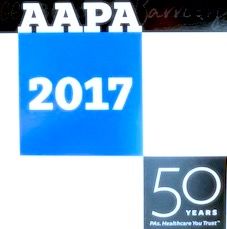Article
CDC Officer Explains Rationale for Not Using LAIV for Influenza at AAPA 2017
Author(s):
CDC task force has recommended not using LAIV (nasal spray) for influenza prevention.

Lisa Grohskopf, MD, MPH, a medical officer with the Centers for Disease Control and Prevention (CDC), shared the findings that led to the agency’s new general recommendations for the 2016-2017 influenza season, going into the specifics around its call behind not using live attenuated vaccines (LAIV) during the 2016-2017 influenza season.
As Grohskopf explained in the CME session at the American Academy of Physician Assistants (AAPA) 2017 Conference, the recommendations of the CDC’s Advisory Committee on Immunization Practices (ACIP) are published for the current US influenza season. These recommendations are designed to prevent and control seasonal influenza with vaccines.
Last August, prior to the start of the 2016-2017 influenza season, the ACIP published in an issue of Morbidity and Mortality Weekly Report, in part: “In light of concerns regarding low effectiveness against influenza A(H1N1)pdm09 in the United States during the 2013-14 and 2015-16 seasons, for the 2016-17 season, ACIP makes the interim recommendation that live attenuated influenza vaccine (LAIV4) should not be used.”
The changes, Grohskopf explained, resulted from several clinical studies. These early, randomized comparative trials of LAIV versus inactivated influenza vaccine (IIV) were conducted pre-pandemic in the 2002-2003 and 2004-2005 seasons, and the LAIVs demonstrated superior efficacy in young children, leading ACIP to prefer the modality for healthy 2-year-olds to 8-year-olds for the 2014-2015 season.
A later study, an analysis of complete US influenza vaccine effectiveness network data for the 2013-2014 season—the first H1N1-predominant season since the 2009 pandemic—revealed no effectiveness of the LAIVs against H1N1pdm09 in the population of 2- through 17-year-olds. However, the IIVs were effective against this strain.
Again in 2014-2015, for 2- through 17-year-olds in the United States, LAIV was found to be no more effective than IIV against the predominant virus, which that year was the drifted H3N2. This contrasted with pre-pandemic studies in which LAIV performed better than IIV against drifted viruses. Based on these findings, ACIP did not renew its preferential recommendation for the 2015-2016 season.
Further, Grohskopf elaborated, no significant effectiveness was found in this age group against H1N1pdm09 for the 2015-2016 season as well, leading ACIP to recommend that the vaccine not be used during the 2016-2017 season.
In the session, she also reviewed the new vaccine products that came available for the 2016-2017 season. These include Flucelvax Quadrivalent and Afluria Quadrivalent, both IIV4s, and Fluad, an IIV3 (all made by Seqirus); Flublok Quadrivalent, an RIV4 (Protein Sciences); and FluLaval Quadrivalent, an IIV4 (GlaxoSmithKline).
Finally, Grohskopf reviewed with the physician assistants the changes to the language of the recommendations concerning vaccinating patients who have known or suspected egg allergies. Although ACIP has removed the 30-minute postvaccination observation period, 15 minutes is still recommended for all vaccines to avoid injury due to syncope. Egg-allergic individuals can receive any licensed, recommended vaccine (either IIV or RIV) that is otherwise appropriate for their age group and risk category.
For individuals with severe egg allergies (ie, any symptom other than hives), one additional measure remains, and that is, from the ACIP recommendation, that the chosen vaccine should be administered in an inpatient or outpatient medical setting, and the administration should be supervised by a healthcare provider who is able to recognize and manage the symptoms of a severe allergic response.




